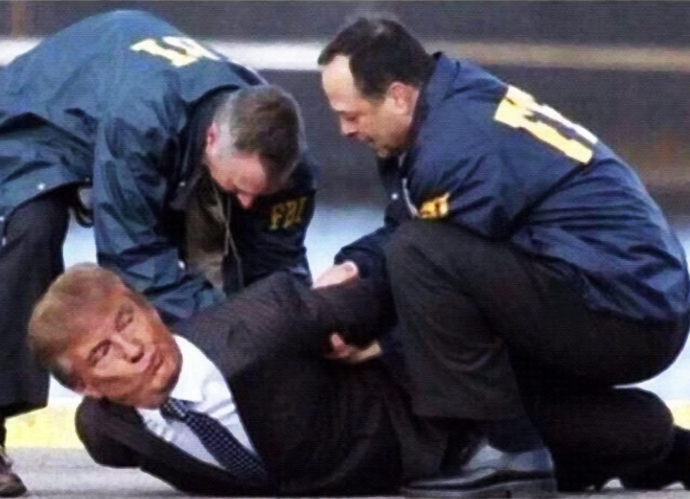“If a president can get away with an attempted coup,” wrote one columnist, “then there’s nothing he can’t do. He is, for all intents and purposes, above the law.” Graphic from Paulus Ar’s Twitter feed, electronically altered by The Panama News.
Critics call out the ‘Let Trump
walk to save democracy’ crowd
by Jessica Corbett – Common Dreams
Amid a flurry of recent claims that prosecuting former President Donald Trump for various alleged crimes would be too dangerous for American democracy, progressive critics are pushing back forcefully to argue that the authoritarian threat will only increase if such lawbreaking is not held to account.
On Tuesday, The New York Times columnist Jamelle Bouie delivered a cogent rebuke of the hands-off argument and declared that “fear of what Trump and his supports might do cannot and should not stand in the way of what we must do to secure the Constitution from all its enemies, foreign and domestic.”
His column followed opinion pieces in the Times by Damon Linker and Rich Lowry warning that the US Department of Justice or others pursuing Trump could set a “dangerous precedent” and provoke future unwarranted probes of Democratic elected officials.
Meanwhile, others have even proposed that President Joe Biden offer his 2020 opponent a pardon with the condition that he doesn’t seek elected office again.
The argument that “American democracy might not survive the stress” of investigating or prosecuting Trump, Bouie wrote, “rests on two assumptions that can’t support the weight that’s been put on them.” First, he pushed back against the idea that US politics “has, with Trump’s departure from the White House, returned to a kind of normalcy,” and thus, “a prosecution would be an extreme and irrevocable blow to social peace.”
“The most important of our new realities is the fact that much of the Republican Party has turned itself against electoral democracy,” he argued, citing the ouster of US Rep. Liz Cheney (R-W) and public support for Arizona and Pennsylvania’s GOP candidates for governor, Kari Lake and Doug Mastriano, who both back Trump’s “Big Lie” about the 2020 election.
“Big Lie” supporters “are actively working to undermine democracy for the next time Trump is on the ballot,” Bouie emphasized. According to him:
This fact, alone, makes a mockery of the idea that the ultimate remedy for Trump is to beat him at the ballot box a second time, as if the same supporters who rejected the last election will change course in the face of another defeat. It also makes clear the other weight-bearing problem with the argument against holding Trump accountable, which is that it treats inaction as an apolitical and stability-enhancing move — something that preserves the status quo as opposed to action, which upends it.
But that’s not true. Inaction is as much a political choice as action is, and far from preserving the status quo — or securing some level of social peace — it sets in stone a new world of total impunity for any sufficiently popular politician or member of the political elite.
Now, it is true that political elites in this country are already immune to most meaningful consequences for corruption and lawbreaking. But showing forbearance and magnanimity toward Trump and his allies would take a difficult problem and make it irreparable. If a president can get away with an attempted coup (as well as abscond with classified documents), then there’s nothing he can’t do. He is, for all intents and purposes, above the law.
Journalists, scholars, and other critics of those pushing prosecutors to let Trump walk welcomed Bouie’s piece — which reporter Dave Levitan called a “very clear rebuttal of all the we-can’t-prosecute-him arguments out there.”
Tweeting a link to the column, Adam Serwer, a staff writer at The Atlantic, said that “among the problems with ‘just beat Trump at the ballot box a second time’ is that the same people didn’t accept that the first time, they invented a fantasy for why it didn’t count. If the issue with criminal prosecution of Trump is his biggest fans not accepting the legitimacy of that… [they] won’t accept the legitimacy of any outcome he does not tell them to accept. Can’t get there from here.”
Others highlighted Bouie’s use of American history — specifically, the emergence of the Jim Crow South in the wake of the US Civil War — to drive home his point that the suggestion that declining to pursue Trump criminally will lead to stability “is foolish to the point of delusion.”
“National politics in the 1870s was consumed with the question of how much to respond to vigilante lawlessness, discrimination, and political violence in the postwar South,” Bouie explained. “In the face of lawlessness, inaction led to impunity, and impunity led to a successful movement to turn back the clock on progress as far as possible, by any means possible.”
Summarizing the columnist, Nicholas Grossman, a University of Illinois at Urbana-Champaign international relations professor, said, “Not holding Confederates accountable to get social peace led to Jim Crow.”
Quoting Bouie’s argument that “there is a clear point at which we must act in the face of corruption, lawlessness, and contempt for the very foundations of democratic society,” Grossman asserted that “now is such a time.”
Linker on Sunday made clear he believes Trump deserves to be prosecuted by Attorney General Merrick Garland for the January 6, 2021 attack on the US Capitol and potentially mishandling documents seized by federal agents at Mar-a-Lago earlier this month, but also warned of the lack of happy endings, writing that it would “set an incredibly dangerous precedent” for future GOP administrations and likely not prevent Trump from running for president again.
Even if Trump couldn’t run or another candidate — such as Florida Gov. Ron DeSantis — got the GOP’s 2024 nomination, “How long do you think it would take for a freshly inaugurated President DeSantis to pardon a convicted and jailed Donald Trump? Hours? Minutes?” Linker wrote. “And that move would probably be combined with a promise to investigate and indict Joe Biden for the various ‘crimes’ he allegedly committed in office.”
Some, such as writer and editor Graham Vyse, concluded: “This is well worth reading even if you don’t agree with its conclusion. [Linker] walks us through a bunch of very troubling scenarios. We are in a bad place.”
Michael Sozan, a senior fellow at the Center for American Progress, similarly said that “I disagree with this [Linker] essay, even though it makes valuable points. No one is above the law, especially someone as dangerous to democracy as Donald Trump. 3-D political chess is impossible to play here; let’s start with basic accountability.”
Columbia University professor Nicholas Christie-Blick tweeted that the path Linker “advocates is basically to throw in the towel — to agree that American democracy is done, that a president cannot be held accountable for even the most egregious crimes. Sorry. I don’t agree.”
Like Linker, Lowry suggested Monday that indicting Trump “would invite retaliation” from the GOP, adding that “all of the criminal investigations of Mr. Trump and his associates — whether related to January 6, his handling of classified material, the Georgia electors, or the Trump Organization — are being handled by partisan Democrats at the federal or local level who have every incentive to nail him to the wall. This isn’t a formula for legitimacy.”
“Another obstacle to the widespread acceptance of a potential indictment of Mr. Trump for January 6 is that, absent smoking-gun evidence we aren’t aware of, it will be far from a clear-cut case,” he also wrote. “An indictment on the grounds that he obstructed Congress or defrauded the US government will depend on novel interpretations of the law and present entirely new legal questions that, at best for the prosecution, will take years to settle and, at worst, ultimately lead to a collapse of the case.”
Several critics of the question in Lowry’s headline — “Can You Tell Me What Would Happen if the FBI Were Investigating a Democrat?” — accused him of what Hussein Ibish, senior resident scholar at the Arab Gulf States Institute in Washington, described as “whataboutism gone bestial.”
Jim Cottrill, an associate professor of political science at St. Cloud State University, tweeted: “This is the biggest pile of horseshit I have read in a long time. The level of false equivalence achieved here is truly remarkable. I began reading it with the assumption it was going to be satirical — alas, it was not.”
Pointing to the lines about who’s behind the Trump investigations, Cottrill said, “Uh, Christopher Wray might beg to differ,” referring to the director of the Federal Bureau of Investigation, who was appointed by Trump.
Journalist Marcy Wheeler also noted Wray in a detailed takedown.
“Obviously this piece sucks in a 100 different ways,” attorney and podcast co-host Ben Yelin said of Lowry’s column. “But there’s one especially fatal error: He doesn’t even contend with the fact that maybe Trump committing lots of crimes is the reason he’s been targeted!”
Contact us by email at fund4thepanamanews@gmail.com
To fend off hackers, organized trolls and other online vandalism, our website comments feature is switched off. Instead, come to our Facebook page to join in the discussion.
These links are interactive — click on the boxes












